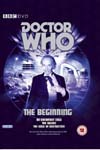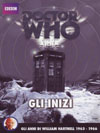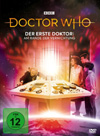Previously, fans who had missed the original broadcast (often by not being born early enough) could only judge this story by its official novelization from John Lucarotti for Target Books, a somewhat condensed affair that wasn't particularly effective at highlighting and conveying the production's strengths, managing to feel as though it were still too long, and somehow surprisingly boring. I believe the story should become infamous for committing one cardinal, critical error, which no version of the story available today has successfully de-emphasized properly. This mistake is all in defining the goals of the regular characters. As portrayed in the book, they would have loved to simply dematerialize in the TARDIS and move on to their next adventure, but the TARDIS is suddenly out of power, and then it is kept away from them by Marco Polo's caravan and the Chinese. Result: the audience is also interested in only seeing the characters get back into the TARDIS and move on to their next destination, especially those of us who like Doctor Who for its science fiction elements which are not active in this story. To an extent, almost every season one story features a challenge preventing our regulars from moving on in the TARDIS as soon as they might like, but "Marco Polo" is particularly bad because it attempts to make this the main thrust of the drama until it occupies 50% or more of the characters' screen time over seven episodes. What this story desperately needs is for one or more of the main characters to take interest in Marco's journey - to the extent that the plot will revolve around that interest, much as Barbara managed to do in Lucarotti's upcoming Aztec story, resulting in much essential, philosophical conflict between her and the Doctor. In this story, the regulars just don't care and don't want to be there, and as a result, neither does the audience. In fact, Marco Polo himself is not all that interested in his own journey either, since he has already made the trip many times at this point in his life, and he would much rather be at liberty to remain at home in Venice!
Episode Two - The Singing SandsThis episode has its moments, but is far from great. William Hartnell's Doctor does not appear until the last five minutes, and only then to mumble and collapse and be fussed over. They should have given him the week off, and written his character into "The Keys of Marinus" episode 3 instead, but no such wisdom was followed.The other three regulars do an exceptionally good job of being interesting on their own. Having to waste no time looking for the absent Doctor, they can carry on with their relationships with Marco, Tegana, and Ping Cho, until Hartnell is scarcely missed. There's some fine acting while going over the problem of the time travellers wishing they were elsewhere - their death-knell motivation that should be removed from the story. The episode fairs better as the concepts of a moonlit desert at night, and later a sandstorm are explored. However, when this finally needs to be turned into a man vs. nature conflict, additionally adding man vs. man as characters debate the best way of dealing with nature, the acting is a let down. Susan and Barbara revert to their idiotic, desperate panic modes, filling the soundtrack with unnecessary inarticulate noise, while Ping Cho, Marco, and Ian get dragged into it with them as they too try to interact and be heard. The episode's best conflict turns out to be fueled by Tegana, as his intrigue is spelled out for the audience, creating anticipation of juicy conflict to come. But it's a conflict that isn't really here yet, as our protagonists remain blissfully unaware, while the Doctor isn't even present enough to gain the slightest clue.
Episode Three - Five Hundred EyesThe third episode is a significant improvement over the previous one, only spoiled by the occasional outburst of Mark Eden's Marco Polo turning into a control freak and the typically overheated response from our four time-travellers. Although the whole get-back-to-the-TARDIS plotline is less than ideal, William Hartnell has a good scene of outwitting Marco with a second key. This is perhaps entertaining enough to warrant it staying in the episode, along with talk of TARDIS repairs. (Of course one wonders how there weren't two TARDIS keys to begin with in "An Unearthly Child" (story no. 1) so that the Doctor and Susan could each have one and enter the TARDIS separately as they are seen to do.)Ping-Cho's tale of Hulago and the Hashashins should be one of the highlights of the episode, but this turns out to be an over-rehearsed one-sided propaganda version of a story that might once have been real, and its very static monologue recital here isn't that good at gripping an audience. It does perhaps still fit thanks to later payoff in the cave. We can be thankful though that William Hartnell's Doctor is very busy and heroic in this episode, and surprise surprise, gets some scenes inside the TARDIS. Here he is, solving problems of crossing the desert, outwitting Tegana without anyone realizing it except Tegana and the audience, and becoming a central figure exploring the Cave of Five Hundred Eyes on a rescue mission. Excellent job. The Cave is one of the story's highlights, and features some excellent design work on the carved faces. More traditional Doctor Who plot points seem to be at work here, and are exceptionally well executed. A good cliffhanger leads us to anticipate more of the same next week, with the stakes raised a bit higher again....
Episode Four - The Wall of Lies (directed by John Crockett)Episode Four isn't too bad while it is wrapping up events in the Cave of Five Hundred Eyes, rich as that setting is with intrigue. Tegana proves to be quite a slippery foe, able to stay on Marco's good side through quick thinking.The episode tanks soon after, as the angst that the time-travelers have to leave Cathay comes before any desire to do good deeds for Marco, and makes them deceitful in front of him. Tegana expertly uses that to his advantage, distracting Marco from the real dangers he should be wary of. And the story palpably feels as though it is dragging at this stage, unable to come up with a conflict we haven't already seen, and failing to move through to a conclusion as it should. It really is just perpetuating more of itself without good reason.... John Crockett must be enjoying Tristram Cary's music in this episode, as he will later pinch some of the cues used here and add them to Richard Rodney Bennett's score when he comes to direct "The Aztecs" (story no. 6) several weeks later....
Episode Five - Rider From Shang-TuThere is a decent beat at the beginning of this episode as Marco and the time travelers unite against an attack of bandits - at last some decently motivated action reminiscent of most good Doctor Who stories. As the episode progresses, the moronic desire to leave the story takes over, which when retardedly thwarted, makes one wonder why one is still watching."Marco, I wish I could explain to you, how important the TARDIS is to us."Alright then, why don't you? Talk to him about it traveling through time, how there's no way to recreate it in this time and place, where each of the travelers comes from. Stop talking down to the people of 1289 A.D., and start being honest with them. Tell them too how lost you are in time and space, and how the Khan could do little better than to lose himself or his armies as well should he use it. The alternative deception is stagnant and boring.And good God, why do Ping-Cho and the time travelers promise Marco on separate occasions that they will not try to get the keys and get back into the TARDIS when he asks them to? It's their aim to get those keys and take-off. When he asks for those promises, they should tell him where he can stick his ideas. Utter rubbish. Further good bits include a messenger explaining his trade to the travelers and thus the audience, some really nice character moments between Susan and Ping Cho, and a meeting with a bizarre way station manager whose acting style will no doubt not be to every viewer's tastes. William Hartnell has some fun imitating him and putting him down. But this episode in particular can't rise above the escape drive that isn't going anywhere, and is all much-ado-about-nothing for the most part. The audio quality is noticeably more challenging on this episode than many others as well. As much as I normally like TARDIS interior scenes in the middle of an adventure, and this episode surprisingly gives us the longest and most proper interior views in the entire story, these interior scenes bridging this episode and the next are at the center of some of the dumbest story beats ever on Doctor Who. "Marco Polo" really proves to be a tale of little progress here.
Episode Six - Mighty Kublai KhanThis turns out to be one of the better episodes of the story, although it takes some time to show its quality. The reprise of course has to clean up the wasted tension surrounding another failed attempt by the protagonists to leave the story early. Ian finally comes clean with Marco surrounding the time travel ability of the TARDIS, but still doesn't attempt to make any case for how useless it would be to the Khan, or suggesting alternatives to solve Marco's problem of getting home to Venice which is the real source of the trouble. Even with the extra step of honesty, there are no developments here.While the Doctor is not seen for most of the middle of this episode, Ping Cho launches off on what at first looks to be a subplot designed to help pad this story out to its allotted length. Ultimately she doesn't need any motivation for this from the fiasco over the TARDIS key, as her engagement situation is motivation enough. But what really works is the fact that this is the beginning of a larger hook giving the protagonists a view into the real villains' plans, not to mention launching a separate strand of the story. This is the kind of development that the story so badly needed. Final portions of the episode prove entertaining once again as the Doctor and most of the entourage get to meet Kublai Khan. We haven't had anything this worthy of exploration on this long trek since the Cave of Five Hundred Eyes. Talk of armies gradually taking up positions is EXCELLENT. The stakes are successfully raised here, creating anticipation of a good final episode next week, while the cliffhanger is about something far more relevant than another aborted attempt to cop out of the story.
Episode Seven - Assassin at PekingConsidering what we've learned about the origins of the word "assassin" earlier in this story, one wonders if the title shouldn't have been "Hashashin at Peking"? ...but that wouldn't have been entirely accurate.The momentum building up to the last episode's cliffhanger isn't really sustained here, as the writer seems keen to revert back to the old formulas he's been padding the story out with since episode two. Not all the development has been lost, but the restraint feels awkward and unnatural. William Hartnell's Doctor continues to get many good scenes with Kublai Khan. These look like they're getting somewhere, but again, it all turns out to be a bit artificial. Most of our guest characters get decent resolution for the various plots and arcs they are involved in, and our four regulars equally get their due as a sort-of undifferentiated quartet. But the story feels like it simply coasts through these final turns of events after having run out of gas and time, and the "solutions" that succeed in the end seem under-motivated, less interesting, and not as well-thought-out as earlier solutions that failed. In particular, Tegana has been too obvious a villain since episode one for him to remain interesting or really work as a still-unmasked infiltrating traitor in episode seven. I think we would have needed a second villain to be revealed in the last episode, while Tegana could have been given more rope to act on his true colours earlier on. The Doctor and crew get a bit of a good scene near the end where they try to piece together some of the political intrigue of the story, but it really is too little too late, and their ability to use this to aid the resolution is far too marginal to be ideal. This episode is still one of the better ones of the story, but let's face it: With the characters as misguidedly motivated as they have been all through this, "Marco Polo" does not turn out to be all that great a story in the end. The third episode is my favourite, as the Doctor, the conflicts, and the philosophical thrust of the story are in better form there than anywhere else in the tale.
"Condensation, do you understand?"
Journey to Cathay, or The Scenic Route to Marinus?
International Titles:Deutsch: "Marco Polo"
This story is now available on audio CD and, in a condensed form, on DVD:
This package also includes:
Comments on this article are welcome. You may contact the author from this page:
|
|||||||||||||||||||||||||||||||||||||||
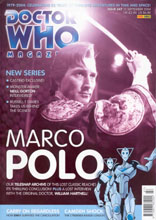


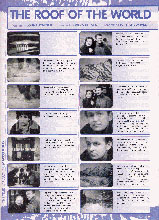

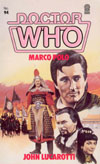
 2006
2006 2006
2006